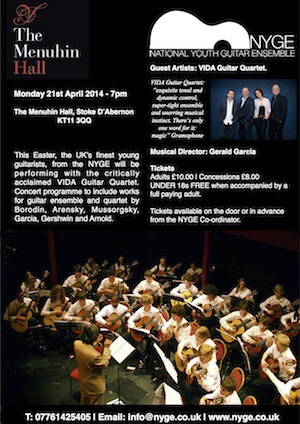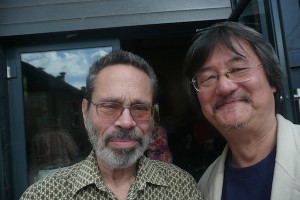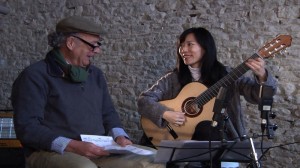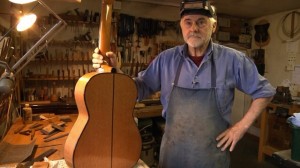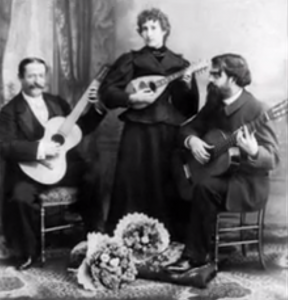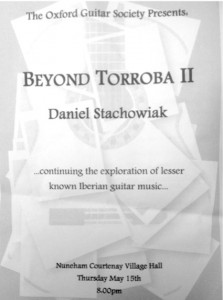
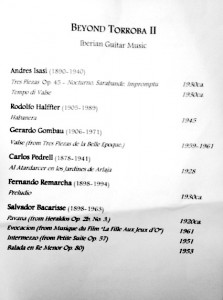
When was the last time you saw a programme like this (unless you were lucky enough to attend the Oxford Guitar Society meetings)?
Daniel Stachowiak refreshingly original programme was performed with great panache as well as being scholarly. The most crowd pleasing pieces were probably the Bacarisse or the Pedrell (Carlos, who was the nephew of Felipe Pedrell). There were also rare pieces by Andres Isasi, a Basque composer who wrote many orchestral and chamber works, but only a handful for guitar. This is the sort of territory explored by Ricardo Iznaola, Eugenio Tobalina etal and takes in the Jose Sonata, amongst other significant guitar works which are just coming to light.
This was definitely not rent-a-programme!
Daniel’s first programme for the Oxford Guitar Society was:
Beyond Torroba: Iberian Guitar Music from the 1920s and 1930s
Peacock-Pie (Tres Piezas Infantiles), 1923 – Ernesto Halffter (1905-1989)
Giga Op. 3, 1930 – Rodolfo Halffter (1900-1987)
Sonata del Escorial No 1 Op. 2, 1928 – Rodolfo Halffter
Española, 1930 ca. – Rosa Garcia Ascot (1902-2002)
Corranda (Ancienne Danse Catalane), 1926 – Agusti Grau (1893-1964)
Romancillo, 1923 – Adolfo Salazar (1890-1958)
Romanza, 1921 – Jose Maria Franco (1894-1971)
Homenaje a Matteo Albeniz, 1930 ca. – Gustavo Pittaluga (1906-1975)
Pavana (Heraldos Op. 2b, No 3), 1920 ca. – Salvador Bacarisse (1898-1963)
Tempo di Valse, 1930 ca. – Andres Isasi (1890-1940)
Impromptu (Tres Piezas Op. 45), 1930 ca. – Andres Isasi
I managed to have a word with Daniel afterwards. He spoke about his interest in obscure original guitar repertoire and his journey as an avid guitar student from the age of six until the present day.
Being a purveyor of recherché guitar music myself, I was fascinated to hear his story, and see some of the scores.
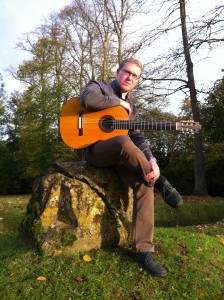
Here is Daniel’s Story:
I started playing the classical guitar at the age of six. I had a visiting guitar teacher come and teach at my primary school in Italy and that’s how I picked it up. My parents were always very supportive of my musical development.
My dad is from the USA and for a while he used to play the clarinet and sax in a band in his twenties in upstate New York to support himself.
At school, I was the kid that always figured out all the new songs quicker than the others in guitar lessons and my first guitar teacher decided that he wanted to teach me privately on a one to one basis. From there, I quickly enrolled into a specialised music school and, shortly after, I auditioned to enter into the local state music conservatory under the guidance of Pierluigi Corona. He is very fond of left hand technique and I credit him for helping me develop a strong left hand as we would spend hours together just working on left hand exercises. In terms of repertoire, we played a lot of Giuliani, Regondi, Bach, Torroba and Dyens.
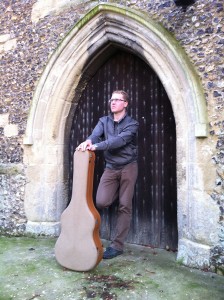 I also studied with Marko Feri who instilled into me an obsessive attention to right hand sound production. I was so engulfed with left hand exercises and technique that I really did not pay attention to my right hand posture and the way it affects the sound you make. Marko Feri really helped me develop my right hand and also, as I grew older, a musical understanding of the pieces I was playing. At the time, we played a lot Castelnuovo-Tedesco.
I also studied with Marko Feri who instilled into me an obsessive attention to right hand sound production. I was so engulfed with left hand exercises and technique that I really did not pay attention to my right hand posture and the way it affects the sound you make. Marko Feri really helped me develop my right hand and also, as I grew older, a musical understanding of the pieces I was playing. At the time, we played a lot Castelnuovo-Tedesco.
My last mention goes to Frederic Zigante, who instilled in me my current interest into researching lesser known guitar music. He pioneered the music of Alexandre Tansman and focused on his lesser well know pieces. To this day, I consider Tansman’s Preludio from the Cavatina, Danza Pomposa and Mazurka to be amongst some of my favourite guitar music of all time.
Independently, whilst studying for my IB diploma at the United World College of the Adriatic in Italy, I started investigating and playing as much guitar music as I could get my hands on written by non-guitarist composers.
I played a lot of Ponce and Mompou during that period alongside my favourite Tansman tunes. It’s through the latter’s posthumous works published by Berben in Gilardino’s The Segovia Archive series that I became fascinated with all of the music composed by mainly non-guitarist composers which Segovia never really played or paid much attention to for one reason or another.
To this present day, I am still working out and performing pieces from that series. Currently I am working on the pieces written by the Catalan composer Jaume Pahissa.
In 2005, I graduated from the state music conservatory with full marks. The final test required giving a 75 minute recital. I played transcriptions of lute music by Molinaro, works by Castelnuovo-Tedesco and Berkeley, and some Bach and Giuliani. The same year, I left Italy for the UK for a three year stint at Oxford University, reading music at St Peter’s College. As a classical guitarist fresh from graduation, I was hoping that the world of Oxford academia would be an ideal place to pursue further my musicological interest in 20th century guitar music written by non-guitarist composers. I quickly discovered that I was the only classical guitarist reading for a degree in music and, in a insular world dominated by choral music and organ scholars, I did not really feel part of Oxford’s musical scene. Back in Italy, I started transcribing lute music for guitar from tablature and this side interest of mine became my main field of interest at Oxford University. I borrowed a lute and taught myself how to play the lute and read music straight from tablature. I then took lessons with the Oxford lutenist Matthew Spring and started playing the lute full time and pretty much retired my guitar for the moment.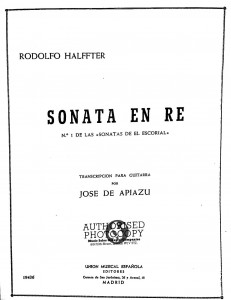
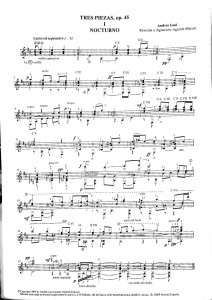
I finally felt I had something to offer in Oxford and was in constant demand as a lutenist.
I was very popular with singers and played many lute songs at the time. My Oxford experience culminated in 2008 with a critical edition of a hard-to-find anthology of lute music compiled in the 17th century by Pietro Paolo Raimondi along with a lute recital at the Holywell Music Room.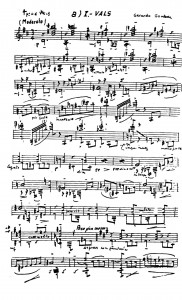
How did I return to the classical guitar? Well, in 2008-2009 I took a PGCE course at Oxford Brookes University training to be a secondary school music teacher and in 2009-2010 I worked towards a masters degree in music.
The Oxford bubble of early music, countertenor singers and lutes of various sizes was behind me. During those two years I slowly started revisiting my favourite Tansman, Ponce, Torroba and other ‘golden oldies’ and in 2010 I joined the Buckinghamshire Music Service as a peripatetic classical guitar teacher.
I fully regained my command of the guitar and I even think I managed to improve my technique since my days as a keen guitarist in Italy. I resumed my research into lesser known guitar music composed by non-guitarist composers and was lucky enough to get in touch through the Internet with a group of keen South American collectors of rare guitar music who helped locate a lot of the music I perform these days.
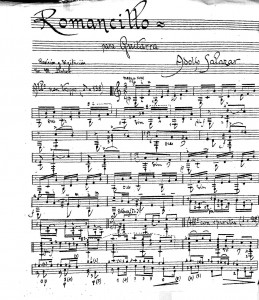 At first, my recitals were based around the theme of Segovia, presenting both music he liked to play and music which unfortunately he wasn’t able to fit into his busy concert schedule. I particularly enjoyed playing Albert Roussel’s Segovia, Gustave Samazeuilh’s Serenade and of course Tansman’s Mazurka. All three works were written for Segovia in 1925 as a result of his Parisian debut concert in the hall of the city’s Conservatoire the year before.
At first, my recitals were based around the theme of Segovia, presenting both music he liked to play and music which unfortunately he wasn’t able to fit into his busy concert schedule. I particularly enjoyed playing Albert Roussel’s Segovia, Gustave Samazeuilh’s Serenade and of course Tansman’s Mazurka. All three works were written for Segovia in 1925 as a result of his Parisian debut concert in the hall of the city’s Conservatoire the year before.
Currently, my main interest is investigating Iberian guitar music written between the 1920s and 1950s beyond the Torroba, Turina and Rodrigo canons. Some of the music belongs to the sphere of Segovia such as the works by Jaume Pahissa, Jose Antonio de Donostia, Gaspar Cassado Pedro Sanjuan and Vicente Arregui, but a lot of it belongs under the umbrella of music composed for Emilio Pujol, Regino Sainz de Maza and Narciso Yepes. In it, we mainly find guitar music composed by the forward thinking group of Madrid composers known as the Grupo de los Ocho (Ernesto Halffter and his brother Rodolfo, Juan Jose Mantecon, Julian Bautista, Fernando Remacha, Rosa Garcia Ascot, Salvador Bacarisse and Gustavo Pittaluga).
Other composers worth also mentioning are members of the Catalan Group of Eight (El Grup dels Vuit) Agusti Grau, Federico Mompou and Roberto Gerhard, the Basque Andres Isasi, the eclectic Gerardo Gombau and finally Adolfo Salazar, Jose Maria Franco and Eduardo Lopez-Chavarri; composers who were part of the broader group of artists known as the Generation of ’27.
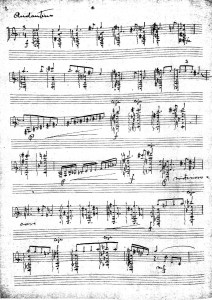
All of this goes without even having mentioned Antonio Jose and his monumental Sonata para Guitarra. I seem to have a mental block against the piece and still haven’t found the courage to work it out properly. Personally, I prefer to drift from one short piece to another grouped together under a common research umbrella. In order to offer a broader story line to these groups of composers, I also include in my performances a couple of cheeky transcriptions from piano works mostly done in the 50 and 60s by the Basque guitarist Jose de Azpiazu.
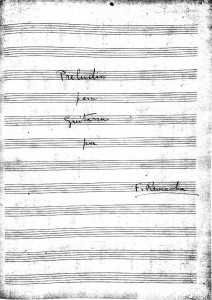
I firmly believe that all of this mostly forgotten Iberian guitar music should be more well known as most of it, in my opinion, is very playable, audience-friendly and doesn’t require excessive editing.
Currently, the challenge of this repertory is tracking it all down as much of it remains still in manuscript form or published by small specialist publications in Spain.
For example, I am yet to get my hands on Juan Jose Mantecon’s Danza del Atardecer and Jesus Bal y Gay’s Pastoral both composed in the 1930s for Regino Sainz de la Maza. Maybe sometime in the near future, I will make the pilgrimage to Spain and visit the Juan March archives in Madrid where all of this excellent guitar music is kept.
[hr]
This was certainly an enterprising programme containing most interesting and musical material.
Congratulations to Daniel – may his spirit of adventure continue, and congratulations to the Oxford Guitar Society for having the acumen to put on such an adventurous programme and performer. Vivant!
Daniel’s YouTube Channel including music by Isasi and Halffter.
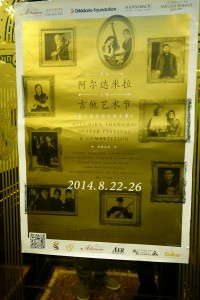 A personal take on this amazing event which had 450 contestants and 120 jury, and concerts and clsasses by Aniello Desiderio, Eliot Fisk, the Amadeus Duo, Emma Rush, Eva Beneke, Kuang Junhong, Beijing Quartet, etc and yours truly with a movement from
A personal take on this amazing event which had 450 contestants and 120 jury, and concerts and clsasses by Aniello Desiderio, Eliot Fisk, the Amadeus Duo, Emma Rush, Eva Beneke, Kuang Junhong, Beijing Quartet, etc and yours truly with a movement from
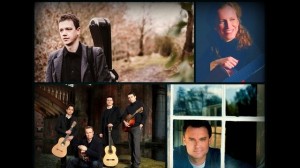




 I also studied with Marko Feri who instilled into me an obsessive attention to right hand sound production. I was so engulfed with left hand exercises and technique that I really did not pay attention to my right hand posture and the way it affects the sound you make. Marko Feri really helped me develop my right hand and also, as I grew older, a musical understanding of the pieces I was playing. At the time, we played a lot Castelnuovo-Tedesco.
I also studied with Marko Feri who instilled into me an obsessive attention to right hand sound production. I was so engulfed with left hand exercises and technique that I really did not pay attention to my right hand posture and the way it affects the sound you make. Marko Feri really helped me develop my right hand and also, as I grew older, a musical understanding of the pieces I was playing. At the time, we played a lot Castelnuovo-Tedesco.


 At first, my recitals were based around the theme of Segovia, presenting both music he liked to play and music which unfortunately he wasn’t able to fit into his busy concert schedule. I particularly enjoyed playing Albert Roussel’s Segovia, Gustave Samazeuilh’s Serenade and of course Tansman’s Mazurka. All three works were written for Segovia in 1925 as a result of his Parisian debut concert in the hall of the city’s Conservatoire the year before.
At first, my recitals were based around the theme of Segovia, presenting both music he liked to play and music which unfortunately he wasn’t able to fit into his busy concert schedule. I particularly enjoyed playing Albert Roussel’s Segovia, Gustave Samazeuilh’s Serenade and of course Tansman’s Mazurka. All three works were written for Segovia in 1925 as a result of his Parisian debut concert in the hall of the city’s Conservatoire the year before.


